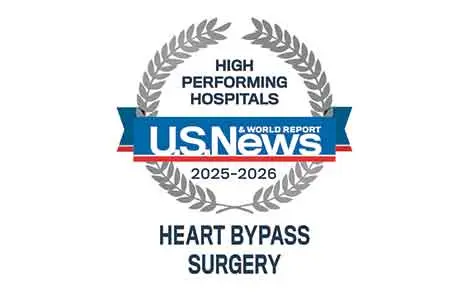Heart Bypass Surgery (Coronary Artery Bypass Grafting)
Make an Appointment
When a heart attack strikes, heart bypass surgery (also called coronary artery bypass graft) can save your life. This surgery makes a new path for blood to flow around blocked blood vessels in the heart. It restarts blood flow to your heart muscle. And, it reduces chest pain, shortness of breath, and other heart disease symptoms if you get it before a heart attack.
Bypass Surgery at UVA Health
During a coronary artery bypass graft (CABG), we take a blood vessel from a different part of your body. We use it to make a new path for blood to get around blocked heart arteries.
At UVA, we offer two versions of the CABG procedure: standard and minimally invasive.
Your heart care team will talk with you about your options and recommend the best version for you.
Top-Rated Heart Bypass Surgery Care

When you need bypass surgery, the experts at UVA Health are ready to help. U.S. News & World Report gives our heart bypass surgery services the highest possible performance ratings. See how we rank.
What Happens During Bypass Surgery?
During CABG, a surgeon opens your chest to get to your heart. A heart-lung machine helps you breathe and pumps blood while we perform the bypass.
We’ll take a blood vessel from your chest or leg and attach it to your heart to help bring blood flow back to the affected area.
After the surgery, your heart starts working on its own again. We take you off of the heart-lung machine and close your chest.
The surgery takes about 4-5 hours. You’ll stay in the hospital for about 5-7 days to recover.
Treat Your CAD, Prevent a Heart Attack
Why Do I Need Bypass Surgery?
Atherosclerosis happens when cholesterol and fatty deposits build up on the walls of your heart arteries and slow down or stop blood flow. It may lead to chest pain or heart attack.
You might need CABG if lifestyle changes and medication haven't made your artery disease better. Cardiologists often recommend CABG when they find:
- Severe blockage in the main artery or in several blood vessels that supply blood to the heart
- Persistent chest pain that does not get better with other treatments